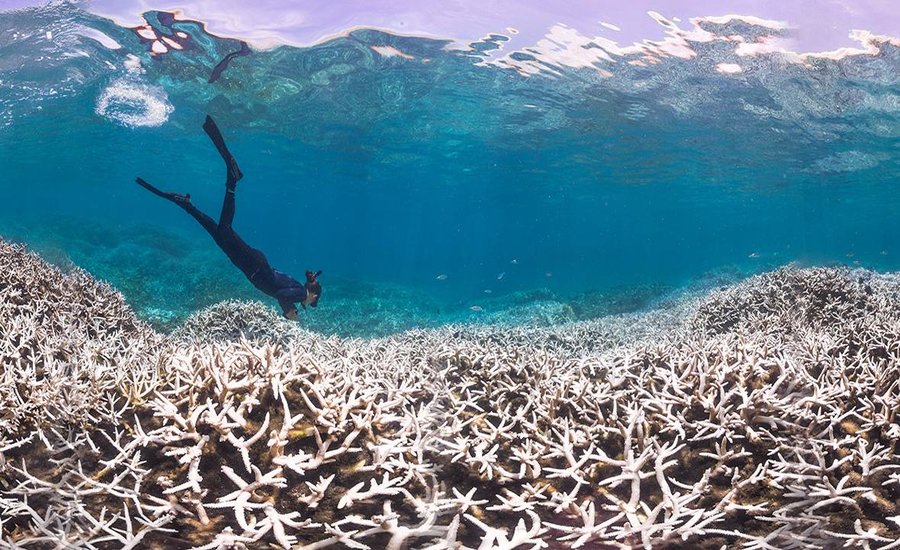Climate change leaves no part of the planet untouched, and the ocean is no exception. As global temperatures rise and weather patterns become more erratic, the delicate balance of marine ecosystems faces increasing jeopardy.
The ocean serves as Earth’s largest carbon sink, absorbing roughly 90% of excess heat generated by greenhouse gases and around 30% of carbon emissions. Known as blue carbon, this stored carbon is vital for mitigating climate change. Neglecting the health of our oceans means losing a crucial ally in the battle against climate change.
Let’s delve into how climate change affects the ocean, exploring its consequences such as rising sea levels, biodiversity loss, marine heatwaves, and ocean acidification. We'll also discuss the importance of safeguarding the ocean and ways individuals can contribute.
Rising Sea Levels
One of the most visible impacts of climate change on the ocean is the rise in sea levels. This rise occurs primarily due to the melting of ice sheets and glaciers, as well as the expansion of seawater as it warms.
Since 1880, sea levels have surged by over 23 centimeters (8 inches), with a significant increase observed since 1993. This acceleration highlights the human-induced nature of recent climate change. Currently, the global sea level rise rate exceeds 2.5 centimeters (1 inch) per decade.
Why It's a Concern
Rising sea levels heighten the risk of coastal flooding, storm surges, and extreme weather events. Coastal communities and low-lying areas face threats to their safety, livelihoods, and ecosystems. Additionally, species like sea lions, already vulnerable due to habitat loss, confront further challenges as rising seas encroach upon their breeding grounds.
Marine Heatwaves
Marine heatwaves—prolonged periods of abnormally high ocean temperatures—are becoming more frequent and intense due to climate change. These heatwaves, akin to terrestrial heatwaves, can have detrimental effects on marine life.
Why It's a Concern
Marine heatwaves contribute to coral bleaching, where corals expel symbiotic algae due to prolonged heat exposure. This weakens corals, making them more susceptible to disease and death. Additionally, heatwaves can trigger harmful algal blooms and disrupt marine ecosystems, impacting biodiversity and ecosystem functions.
Ocean Acidification
Ocean acidification, a consequence of increased carbon dioxide absorption by seawater, poses a significant threat to marine life. As CO2 dissolves in seawater, it forms carbonic acid, lowering pH levels and increasing acidity.
Why It's a Concern
Ocean acidification jeopardizes marine organisms with calcium carbonate shells or skeletons, such as corals and shellfish, by dissolving their protective structures. This weakens their resilience to environmental stressors and disrupts marine food webs. Furthermore, the loss of these organisms as carbon stores undermines natural carbon sequestration processes.
Biodiversity Loss
Climate change contributes to the loss of marine biodiversity, impacting ecosystems, species interactions, and ecosystem services.
Why It's a Concern
Coral reefs, crucial marine ecosystems renowned for their biodiversity, face collapse due to climate change. With projections indicating widespread coral loss with temperature increases, marine biodiversity declines significantly. Loss of key species disrupts ecosystem dynamics and threatens the resilience of marine ecosystems.
Community Livelihood Impacts
Coastal communities reliant on marine resources for sustenance and livelihoods face increased vulnerability due to climate change-induced alterations in fish distribution and habitat degradation.
Why It's a Concern
Climate change exacerbates existing threats to coastal communities, including erosion, flooding, and pollution. Rising sea levels and changing species distributions further jeopardize their livelihoods and well-being. Supporting community conservation efforts enhances resilience to climate change impacts.
Changes in Migratory Patterns
Climate change alters the migration patterns of marine species, affecting their interactions with human activities such as shipping and fishing.
Why It's a Concern
Changes in migratory patterns increase the risk of marine mammals encountering vessels, leading to collisions and bycatch. Monitoring and understanding these shifts are crucial for mitigating threats to marine species.
IFAW's Role in Ocean Conservation and Climate Mitigation
IFAW is dedicated to protecting marine ecosystems and mitigating climate change impacts. Through conservation initiatives, we address the interconnected challenges facing oceans and marine species, striving to create resilient marine environments.













0 Comments